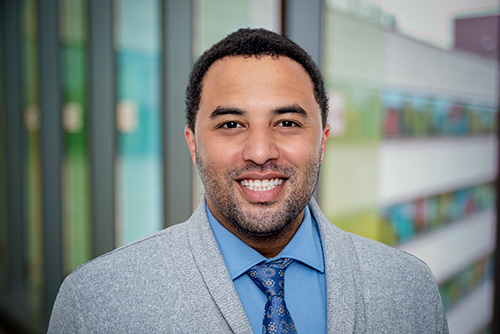
Is Training An Effective Anti-Racist Tool? Dr. Hannibal Person Is On A Journey To Find Out
Can training eliminate racism?
The short answer is no, but many trainings based in action and accountability can provide concrete skills to help advocate for and create change. Bias Reduction in Medicine (BRIM) is a novel training curriculum helping healthcare practitioners develop a stronger understanding of bias in clinical practice.
What is BRIM?
The BRIM (Bias Reduction in Medicine) approach furthers the ability to name bias, provides education on the role implicit bias plays in decision making and action, and introduces evidence-based strategies to reduce bias. BRIM's unique approach is grounded in behavior change psychology with actionable steps and strategies, addressing specific impacts of bias in healthcare on patients and their health outcomes. Seattle Children's supplements with additional training to meet specific organizational anti-racism needs and goals.
In partnership with the University of Washington Department of Pediatrics and originally piloted at Seattle Children’s in 2021 with the Executive Leadership Team, Clinical Operations Leadership Team and select People and Culture leaders, the BRIM pilots continue to expand at Seattle Children’s as Pediatrics+ (BRIMP+) for providers and anti-racism trainings for workforce members.
Two BRIMP+ pilot enactments have occurred to date in the Division of Gastroenterology and Hepatology and the Treuman Katz Center for Bioethics and Palliative Care Program. A third pilot is planned with the Division of Rheumatology.
The curriculum culminates in participating individuals and teams creating anti-racism action plans. Beyond training, BRIMP+ is also research. Eventually a full observational research study will commence at Seattle Children’s, across all divisions with all faculty members participating.
 Dr. Hannibal Person
Dr. Hannibal Person
Dr. Hannibal Person (he/him), is a gastroenterologist and hepatologist at Seattle Children’s and assistant professor at the University of Washington School of Medicine (UWSOM). Person is also a co-investigator and co-facilitator for BRIMP+ at Seattle Children’s.
For nearly the last two years, Person has contributed to the curriculum redesign to be both pediatric focused and grounded in neuroscience to more effectively influence behavior change. “I’m passionate, not only about medical education, but education that improves health equity,” he says.
More Than Awareness
Person acknowledges the disillusionment that often comes with trainings. He identifies as biracial and recalls sitting in medical school lectures where diversity trainings distilled everything thought to be known about caring for African American patients into the span of an hour.
BRIMP+ goes beyond cultural competency, diversity and awareness. Person considers BRIMP+ an advocacy tool, providing advanced skills to help challenge specific instances of racism and create meaningful change. BRIMP+ provides the opportunity to engage with anti-racism on an individual and institutional level, encouraging teams to dismantle racism with bottom-up, rather than top-down, pressure impacting the whole system.
Person emphasizes that completing a training does not equate to completing one’s anti-racism journey. It requires a lifelong commitment and ongoing personal development.
BRIMP+ is an evidence-based curriculum that can foster that commitment, building on four, two-hour workshops that require pre and post work. Regardless of where participants are in their anti-racism journey, BRIMP+ aims to move everyone at least a few steps further along, personally and in their clinical impact.
BRIMP+ Workshop Topics
Racial Literacy and Racial Identity Development
Race-Consciousness and Racial Bias Literay in Health and Medicine
Awareness of Blackness and Anti-Black Racism in Leadership, Health and Medicine
Anti-Racist Praxis: Racial Equity Tools and Communication Strategies for Disrupting Personal, Interpersonal and Institutional Racism in Leadership, Health and Medicine
Personal Action and Accountability
Through a systemic analysis of racial oppression, racial identity development and race-based caucusing, BRIMP+ helps learners translate education into action. Participants review clinical scenarios that directly relate to the complexity of their field and demonstrate racism and anti-Blackness.
When Person facilitated the Gastroenterology BRIMP+ sessions, he intentionally brought in GI practice examples for discussion. BRIMP+’s personalization of the training content sets it apart and makes it more engaging and effective.
BRIMP+ pilot assessments showed that participants appreciated learning in a cohort. Teams help promote accountability. There is motivation to show up and engage when teammates rely on one another.
Some of the most valuable aspects of BRIMP+ are the action plans that participants create, both individually and as a team. A concrete document with specific metrics, proposed timeline and assigned roles, the action plans are meant to be shared with division leadership.
Action plans can turn into tangible equity, diversity and inclusion (EDI) projects, research and meaningful conversations about EDI opportunities. As BRIMP+ scales at Seattle Children’s, curriculum developers will integrate the pilot feedback that participants desire a greater emphasis on action and guidance on how to apply learnings to daily interactions in support of Seattle Children’s HEAR Action Plan.
Partnership
Person has experience developing anti-racism and anti-bias curricula and loves teaching. When he joined UWSOM, he quickly connected with Dr. Roberto Montenegro, who introduced BRIM to UW Pediatrics. The Department had been seeking to provide anti-racist training to faculty, balancing the existing pediatric residency efforts so that both faculty and residents understand how to deliver equitable care and support the increasingly diverse healthcare workforce. BRIM contributed measurable outcomes necessary to assess a training’s effectiveness in changing behavior and improving care.
I am truly thankful for UW and Children's partnership -- together, work continues to provide the best care possible to patients and families. Thanks to Dr. Leslie Walker Harding's (senior vice president and chief academic officer, Seattle Children's; department chair, UWSOM Department of Pediatrics) and Ms. Myra Gregorian's (senior vie president and chief people officer, Seattle Children's) partnership, early and consistent commitment, vision and leadership, we received the support necessary to help not only pilot the program, but also see BRIMP+ delivered to the 500 UW Pediatrics faculty. Strong partnership and commitment between UW Pediatrics leadership/faculty and Children's leadership and administration is critical for successful healthcare provider anti-racism training efforts.
Dr. Roberto Montenegro, clinical assistant professor, Psychiatry Department; adjunct clinical assistant professor and researcher, Pediatrics/Treuman Katz Center for Pediatric Bioethics
As chair of the UW Committee on Minority Faculty Advancement, Person hopes to break down silos across UW Pediatrics and Seattle Children’s, inviting everyone to the same table to collaborate on anti-racism curriculum efforts. “A lot of us are doing anti-racism trainings,” says Person, “and we should all support one another versus duplicating efforts.”
The BRIMP+ team has collaborated with many groups and teams that support anti-racism and health equity, including Seattle Children’s Center for Diversity and Health Equity, to get the Equity Impact Assessment tool incorporated into team action plans. BRIMP+ facilitators like Person are identifying and training other division faculty to serve as facilitators, growing the number of health equity champions who help ensure the curriculum advances tangible work.
Person encourages others, “Find your group. I know how lonely it feels to bring up a topic that makes a room go silent. I understand the frustration and burnout that come with nothing changing. But there are others who have the anti-racism flame — they may not be in your circles, but we exist. Build that community and partner with others to grow your influence. The smallest spark can start a fire. Reach out to me or others who can nurture your spark, and together, with time, our fire will grow.”
Anti-Racism Training at Seattle Children's Is Expanding This Summer
BRIMP+ is tailored for providers. After piloting components of BRIMP+ and learning from the experience, a new anti-racism training open to all Seattle Children's workforce members will be available this summer. The training will build on the required Foundations of Equity, Diversity, Inclusion and Anti-Racism annual web-based training and recommended Equity, Diversity and Inclusion hybrid learning course.